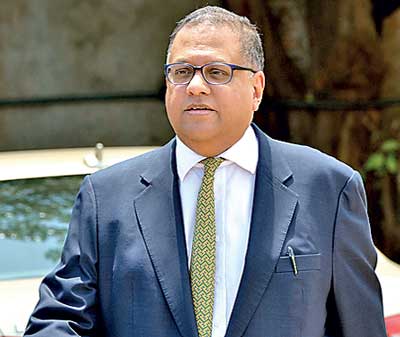Sunday Feb 01, 2026
Sunday Feb 01, 2026
Tuesday, 10 October 2017 00:18 - - {{hitsCtrl.values.hits}}
By Himal Kotelawala
The ongoing cross-examination of former Central Bank Governor Arjuna Mahendran before the Presidential Commission of Inquiry on the controversial bond issuance yesterday focused on the Employees’ Provident Fund (EPF)’s participation in the secondary market towards the end of Mahendran’s tenure as Governor.
 Deputy Solicitor General Milinda Gunatillake, reading from a Central Bank of Sri Lanka (CBSL) press release issued on 2 June 2016, recalled that the Monetary Board of CBSL had, noting the large resource needs of the Government, pointed out that: “In the context of Monetary Policy actions, mainly the upward adjustment of the Statutory Reserve Requirement (SRR) at the beginning of the year and the subsequent upward adjustment of the policy interest rates, had resulted in an increase in yield for Treasury bills and Treasury bonds.”
Deputy Solicitor General Milinda Gunatillake, reading from a Central Bank of Sri Lanka (CBSL) press release issued on 2 June 2016, recalled that the Monetary Board of CBSL had, noting the large resource needs of the Government, pointed out that: “In the context of Monetary Policy actions, mainly the upward adjustment of the Statutory Reserve Requirement (SRR) at the beginning of the year and the subsequent upward adjustment of the policy interest rates, had resulted in an increase in yield for Treasury bills and Treasury bonds.”
The Monetary Board had recommended 1) to the relevant management team, said Gunatillake, a) to hold pre-bid meetings with all primary dealers to share information on market developments and to have a clearly defined auction calendar, and b) to examine the international best practices with respect to volumes advertised and accepted at public auctions and propose to the Board as to how the Central Bank should adopt such practices.
The Monetary Board had then (2) recommended active participation of the EPF in primary auctions.
Gunatillake suggested that the decision was taken due to constant representations made around November 2015 onward that the EPF had been buying bonds at the secondary market rather than from the primary market - the idea being that the EPF would do better buying directly at the primary market than buying in the secondary market from another primary dealer.
“There were also concerns that the Central Bank was advertising lesser amounts and taking larger amounts, and there was a suggestion that CBSL consider advertising the full amount,” he said.
Mahendran agreed, but said that it had been pointed out this would be disadvantageous to the Government.
Gunatillake said the decision, taken towards the end of Mahendran’s tenure as CBSL Governor, was the result of the Central Bank advertising a particular amount and accepting much larger volumes, and the EPF not bidding at primary auctions or bidding unsuccessfully at primary auctions.
“Yes,” said Mahendran.
“And making good the shortfall in treasury bonds while purchasing them in the secondary market,” said the DSG.
Mahenran disagreed with this notion, explaining that there were definitely complaints that the EPF was buying excessively in the secondary market, an issue that was examined and a report submitted to him by another member of the Monetary Board.
Some lapses had been noted, he said, and the superintendent needed to further monitor the situation in order to come to a substantial conclusion.
“[Monetary Board member] Krishantha Perera took this up with you on a fairly frequent basis at several high level meetings,” said Gunatillake.
He added that Mahendran had, as a consequence, taken the decision (specifically item C in the document) for the EPF to submit bids at reasonable yield rates to primary auctions, and suggested that some of these bids were rejected because their yield rates had been unreasonably high.
Mahendran agreed.
“There was a concern that they must immediately stop or minimise the purchase from the secondary market,” Gunatillake went on to say, adding that this was the reason item C been drafted the way it was.
“There was no decision to stop purchases at the secondary level while I was Governor. Certainly that view was expressed by the member you mentioned, but there was no consensus about that,” said Mahendran.
Explaining the context, the former Governor said the EPF had been facing severe outflows for various reasons, adding that trade in the secondary market would have earned it profits, giving a significant boost to its overall income.
“I don’t agree that that last sentence specified that the secondary trading should be stopped. Certainly that was not the intention when I was Governor,” he said.
However, said Gunatillake, around 12 March 2016, the EPF had, in fact, stopped trading in the secondary market.
Mahendran agreed.
The cross-examination continues today.